- Home
- Emile Gaboriau
Within an Inch of His Life Page 5
Within an Inch of His Life Read online
Page 5
V.
There was not a person in the whole district who did not know of whata fearful disease poor Cocoleu was suffering; and everybody knew, also,that it was perfectly useless to try and help him. The two men who hadtaken him out had therefore laid him simply on a pile of wet straw, andthen they had left him to himself, eager as they were to see and hearwhat was going on.
It must be said, in justice to the several hundred peasants who werecrowding around the smoking ruins of Valpinson, that they treated themadman who had accused M. de Boiscoran of such a crime, neither withcruel jokes nor with fierce curses. Unfortunately, first impulses,which are apt to be good impulses, do not last long. One of those idlegood-for-nothings, drunkards, envious scamps who are found in everycommunity, in the country as well as in the city, cried out,--
"And why not?"
These few words opened at once a door to all kinds of bold guesses.
Everybody had heard something about the quarrel between Count Claudieuseand M. de Boiscoran. It was well known, moreover, that the provocationhad always come from the count, and that the latter had invariably givenway in the end. Why, therefore, might not M. de Boiscoran, impatient atlast, have resorted to such means in order to avenge himself on a manwhom they thought he must needs hate, and whom he probably feared at thesame time?
"Perhaps he would not do it, because he is a nobleman, and because he isrich?" they added sneeringly.
The next step was, of course, to look out for circumstances which mightsupport such a theory; and the opportunity was not lacking. Groups wereformed; and soon two men and a woman declared aloud that they couldastonish the world if they chose to talk. They were urged to tell whatthey knew; and, of course, they refused. But they had said too muchalready. Willing or not willing, they were carried up to the house,where, at that very moment, M. Galpin was examining Count Claudieuse.The excited crowd made such a disturbance, that M. Seneschal, tremblingat the idea of a new accident, rushed out to the door.
"What is it now?" he asked.
"More witnesses," replied the peasants. "Here are some more witnesses."
The mayor turned round, and, after having exchanged glances with M.Daubigeon, he said to the magistrate,--
"They are bringing you some more witnesses, sir."
No doubt M. Galpin was little pleased at the interruption; but he knewthe people well enough to bear in mind, that, unless he took them at themoment when they were willing to talk, he might never be able to get anything out of them at any other time.
"We shall return some other time to our conversation," he said to CountClaudieuse.
Then, replying to M. Seneschal, he said,--
"Let the witnesses come in, but one by one."
The first who entered was the only son of a well-to-do farmer inthe village of Brechy, called Ribot. He was a young fellow of abouttwenty-five, broad-shouldered, with a very small head, a low brow, andformidable crimson ears. For twenty miles all around, he was reputed tobe an irresistible beau,--a reputation of which he was very proud.After having asked him his name, his first names, and his age, M. Galpinsaid,--
"What do you know?"
The young man straightened himself, and with a marvellously conceitedair, which set all the peasants a-laughing, he replied,--
"I was out that night on some little private business of my own. I wason the other side of the chateau of Boiscoran. Somebody was waiting forme, and I was behind time: so I cut right across the marsh. I knew therains of the last days would have filled all the ditches; but, when aman is out on such important business as mine was, he can always findhis way"--
"Spare us those tedious details," said the magistrate coldly. Thehandsome fellow looked surprised, rather than offended, by theinterruption, and then went on,--
"As your Honor desires. Well, it was about eight o'clock, or a littlemore, and it was growing dark, when I reached the Seille swamps. Theywere overflowing; and the water was two inches above the stones ofthe canal. I asked myself how I should get across without spoiling myclothes, when I saw M. de Boiscoran coming towards me from the otherside."
"Are you quite sure it was he?"
"Why, I should think so! I talked to him. But stop, he was not afraid ofgetting wet. Without much ado, he rolled up his trousers, stuffed theminto the tops of his tall boots, and went right through. Just then hesaw me, and seemed to be surprised. I was as much so as he was. 'Why,is it you, sir?' I said. He replied 'Yes: I have to see somebody atBrechy.' That was very probably so; still I said again, 'But youhave chosen a queer way.' He laughed. 'I did not know the swamps wereoverflowed,' he answered, 'and I thought I would shoot some snipes.' Ashe said this, he showed me his gun. At that moment I had nothing to say;but now, when I think it over, it looks queer to me."
M. Galpin had written down the statement as fast as it was given. Thenhe asked,--
"How was M. de Boiscoran dressed?"
"Stop. He had grayish trousers on, a shooting-jacket of brown velveteen,and a broad-brimmed panama hat."
The count and the countess looked distressed and almost overcome; nordid the mayor and his friend seem to be less troubled. One circumstancein Ribot's evidence seemed to have struck them with peculiar force,--thefact that he had seen M. de Boiscoran push his trousers inside hisboots.
"You can go," said M. Galpin to the young man. "Let another witness comein."
The next one was an old man of bad reputation, who lived alone in an oldhut two miles from Valpinson. He was called Father Gaudry. Unlike youngRibot, who had shown great assurance, the old man looked humble andcringing in his dirty, ill-smelling rags. After having given his name,he said,--
"It might have been eleven o'clock at night, and I was going through theforest of Rochepommier, along one of the little by-paths"--
"You were stealing wood!" said the magistrate sternly.
"Great God, what an idea!" cried the old man, raising his hands toheaven. "How can you say such a thing! I steal wood! No, my dear sir,I was very quietly going to sleep in the forest, so as to be upwith daylight, and gather champignons and other mushrooms to sell atSauveterre. Well, I was trotting along, when, all of a sudden, I hearfootsteps behind me. Naturally, I was frightened."
"Because you were stealing!"
"Oh, no! my dear sir; only, at night, you understand. Well, I hid behinda tree; and almost at the same moment I saw M. de Boiscoran pass by. Irecognized him perfectly in spite of the dark; for he seemed to be ina great rage, talked loud to himself, swore, gesticulated, and torehandfuls of leaves from the branches."
"Did he have a gun?"
"Yes, my dear sir; for that was the very thing that frightened me so. Ithought he was a keeper."
The third and last witness was a good old woman, Mrs. Courtois, whoselittle farm lay on the other side of the forest of Rochepommier. Whenshe was asked, she hesitated a moment, and then she said,--
"I do not know much; but I will tell you all I do know. As we expectedto have a house full of workmen a few days hence, and as I was going tobake bread to-morrow, I was going with my ass to the mill on SauveterreMountain to fetch flour. The miller had not any ready; but he told me,if I could wait, he would let me have some: and so I staid to supper.About ten o'clock, they gave me a bag full of flour. The boys put iton my ass, and I went home. I was about half-way, and it was, perhaps,eleven o'clock, when, just at the edge of the forest of Rochepommier, myass stumbled, and the bag fell off. I had a great deal of trouble, for Iwas not strong enough to lift it alone; and just then a man came outof the woods, quite near me. I called to him, and he came. It was M. deBoiscoran: I ask him to help me; and at once, without losing a moment,he puts his gun down, lifts the bag from the ground, and puts it on myass. I thank him. He says, 'Welcome,' and--that is all."
The mayor had been all this time standing in the door of the chamber,performing the humble duty of a doorkeeper, and barring the entrance tothe eager and curious crowd outside. When Mrs. Courtois retired, quitebewildered by her own words, and regretting what she ha
d said, he calledout,--
"Is there any one else who knows any thing?"
As nobody appeared, he closed the door, and said curtly,--
"Well, then, you can go home now, my friends. Let the law have freecourse."
The law, represented by the magistrate, was a prey at that moment to themost cruel perplexity. M. Galpin was utterly overcome by consternation.He sat at the little table, on which he had been writing, his headresting on his hands, thinking, apparently, how he could find a way outof this labyrinth.
All of a sudden he rose, and forgetting, for a moment, his customaryrigidity, he let his mask of icy impassiveness drop off his face, andsaid,--
"Well?" as if, in his despair, he had hoped for some help or advice inhis troubles,--"well?"
No answer came.
All the others were as much troubled as he was. They all tried to shakeoff the overwhelming impression made by this accumulation of evidence;but in vain. At last, after a moment's silence, the magistrate said withstrange bitterness,--
"You see, gentlemen, I was right in examining Cocoleu. Oh! don't attemptto deny it: you share my doubts and my suspicions, I see it. Is thereone among you who would dare assert that the terrible excitement of thispoor man has not restored to him for a time the use of his reason? Whenhe told you that he had witnessed the crime, and when he gave the nameof the criminal, you looked incredulous. But then other witnessescame; and their united evidence, corresponding without a missing link,constitutes a terrible presumption."
He became animated again. Professional habits, stronger than every thingelse, obtained once more the mastery.
"M. de Boiscoran was at Valpinson to-night: that is clearly established.Well, how did he get here? By concealing himself. Between his own houseand Valpinson there are two public roads,--one by Brechy, and anotheraround the swamps. Does M. de Boiscoran take either of the two? No.He cuts straight across the marshes, at the risk of sinking in, or ofgetting wet from head to foot. On his return he chooses, in spite of thedarkness, the forest of Rochepommier, unmindful of the danger he runs tolose his way, and to wander about in it till daybreak. What was he doingthis for? Evidently, in order not to be seen. And, in fact, whom doeshe meet?--a loose fellow, Ribot, who is himself in hiding on accountof some love-intrigue; a wood-stealer, Gaudry, whose only anxiety is toavoid the gendarmes; an old woman, finally, Mrs. Courtois, who hasbeen belated by an accident. All his precautions were well chosen; butProvidence was watching."
"O Providence!" growled Dr. Seignebos,--"Providence!"
But M. Galpin did not even hear the interruption. Speaking faster andfaster, he went on,--
"Would it at least be possible to plead in behalf of M. de Boiscoran adifference in time? No. At what time was he seen to come to thisplace? At nightfall. 'It was half-past eight,' says Ribot, 'when M. deBoiscoran crossed the canal at the Seille swamps.' He might, therefore,have easily reached Valpinson at half-past nine. At that hour the crimehad not yet been committed. When was he seen returning home? Gaudry andthe woman Courtois have told you the hour,--after eleven o'clock. Atthat time Count Claudieuse had been shot, and Valpinson was on fire. Dowe know any thing of M. de Boiscoran's temper at that time? Yes, we do.When he came this way he was quite cool. He is very much surprised atmeeting Ribot; but he explains to him very fully how he happens to be atthat place, and also why he has a gun.
"He says he is on his way to meet somebody at Brechy, and he thought hewould shoot some birds. Is that admissible? Is it even likely? However,let us look at him on his way back. Gaudry says he was walking veryfast: he seemed to be furious, and was pulling handfuls of leaves fromthe branches. What does Mrs. Courtois say? Nothing. When she calls him,he does not venture to run; that would have been a confession, but he isin a great hurry to help her. And then? His way for a quarter of an houris the same as the woman's: does he keep her company? No. He leaves herhastily. He goes ahead, and hurries home; for he thinks Count Claudieuseis dead; he knows Valpinson is in flames; and he fears he will hear thebells ring, and see the fire raging."
It is not often that magistrates allow themselves such familiarity; forjudges, and even lawyers, generally fancy they are too high above commonmortals, on such occasions, to explain their views, to state theirimpressions, and to ask, as it were, for advice. Still, when the inquiryis only begun, there are, properly speaking, no fixed rules prescribed.As soon as a crime has been reported to a French magistrate, he is atliberty to do any thing he chooses in order to discover the guilty one.Absolutely master of the case, responsible only to his conscience, andendowed with extraordinary powers, he proceeds as he thinks best. But,in this affair at Valpinson, M. Galpin had been carried away by therapidity of the events themselves. Since the first question addressed toCocoleu, up to the present moment, he had not had time to consider.And his proceedings had been public; thus he felt naturally tempted toexplain them.
"And you call this a legal inquiry?" asked Dr. Seignebos.
He had taken off his spectacles, and was wiping them furiously.
"An inquiry founded upon what?" he went on with such vehemence that noone dared interrupt him,--"founded upon the evidence of an unfortunatecreature, whom I, a physician, testify to be not responsible for what hesays. Reason does not go out and become lighted again, like the gas ina street-lamp. A man is an idiot, or he is not an idiot. He has alwaysbeen one; and he always will be one. But you say the other statementsare conclusive. Say, rather, that you think they are. Why? Because youare prejudiced by Cocoleu's accusation. But for it, you would neverhave troubled yourselves about what M. De Boiscoran did, or did not. Hewalked about the whole evening. He has a right to do so. He crossed themarsh. What hindered him? He went through the woods. Why should he not?He is met with by people. Is not that quite natural? But no: an idiotaccuses him, and forthwith all he does looks suspicious. He talks. It isthe insolence of a hardened criminal. He is silent. It is the remorseof a guilty man trembling with fear. Instead of naming M. de Boiscoran,Cocoleu might just as well have named me, Dr. Seignebos. At once, allmy doings would have appeared suspicious; and I am quite sure a thousandevidences of my guilt would have been discovered. It would have been aneasy matter. Are not my opinions more radical even than those of M. deBoiscoran? For there is the key to the whole matter. M. de Boiscoran isa Republican; M. de Boiscoran acknowledges no sovereignty but that ofthe people"--
"Doctor," broke in the commonwealth attorney,--"doctor, you are notthinking of what you say."
"I do think of it, I assure you"--
But he was once more interrupted, and this time by Count Claudieuse, whosaid,--
"For my part, I admit all the arguments brought up by the magistrate.But, above all probabilities, I put a fact,--the character of theaccused. M. de Boiscoran is a man of honor and an excellent man. He isincapable of committing a mean and odious crime."
The others assented. M. Seneschal added,--
"And I, I will tell you another thing. What would have been the purposeof such a crime? Ah, if M. de Boiscoran had nothing to lose! But do youknow among all your friends a happier man than he is?--young, handsome,in excellent health, immensely wealthy, esteemed and popular witheverybody. Finally, there is another fact, which is a family secret, butwhich I may tell you, and which will remove at once all suspicions,--M.de Boiscoran is desperately in love with Miss Dionysia de Chandore. Shereturns his love; and the day before yesterday the wedding-day was fixedon the 20th of the next month."
In the meantime the hours had sped on. It was half-past three by theclock of the church in Brechy. Day was breaking; and the light of thelamps was turning pale. The morning mists began to disappear; and thesunlight fell upon the window-panes. But no one noticed this: all thesemen gathered around the bed of the wounded man were too deeply excited.M. Galpin had listened to the objection made by the others, without aword or a gesture. He had so far recovered his self-control, that itwould have been difficult to see what impressions they made upon hismind. At last, shaking his head gravely, he said,--
Count Claudieuse was distressed beyond expression. At last he said,--
"The worst thing about it is, that M. de Boiscoran thinks I am hisenemy. I should not wonder if he went and imagined that these chargesand vile suspicions have been suggested by my wife or by myself. If Icould only get up! At least, let M. de Boiscoran know distinctly that Iam ready to answer for him, as I would answer for myself. Cocoleu, thewretched idiot! Ah, Genevieve, my darling wife! Why did you induce himto talk? If you had not insisted, he would have kept silent forever."
The countess succumbed at last to the anxieties of this terrible night.At first she had been supported by that exaltation which is apt toaccompany a great crisis; but latterly she had felt exhausted. She hadsunk upon a stool, near the bed on which her two daughters were lying;and, her head hid in the pillow, she seemed to sleep. But she was notasleep. When her husband reproached her thus, she rose, pale, withswollen eyes and distorted features, and said in a piercing voice,--
"What? They have tried to kill my Trivulce; our children have been nearunto death in the flames; and I should have allowed any means to beunused by which the guilty one may be found out? No! I have only donewhat it was my duty to do. Whatever may come of it, I regret nothing."
"But, Genevieve, M. de Boiscoran is not guilty: he cannot possibly beguilty. How could a man who has the happiness of being loved by Dionysiade Chandore, and who counts the days to his wedding,--how could hedevise such a hideous crime?"
"Let him prove his innocence," replied the countess mercilessly.
The doctor smacked his lips in the most impertinent manner.
"There is a woman's logic for you," he murmured.
"Certainly," said M. Seneschal, "M. de Boiscoran's innocence will bepromptly established. Nevertheless, the suspicion will remain. And ourpeople are so constituted, that this suspicion will overshadow his wholelife. Twenty years hence, they will meet him, and they will say, 'Oh,yes! the man who set Valpinson on fire!'"
It was not M. Galpin this time who replied, but the commonwealthattorney. He said sadly,--
"I cannot share your views; but that does not matter. After what haspassed, our friend, M. Galpin cannot retrace his steps: his duty makesthat impossible, and, even more so, what is due to the accused. Whatwould all these people say, who have heard Cocoleu's deposition, and theevidence given by the witnesses, if the inquiry were stopped? Theywould certainly say M. de Boiscoran was guilty, but that he was not heldresponsible because he was rich and noble. Upon my honor I believe himto be innocent. But precisely because this is my conviction, I maintainthat his innocence must be clearly established. No doubt he has themeans of doing so. When he met Ribot, he told him he was on his way tosee somebody at Brechy."
"But suppose he never went there?" objected M. Seneschal. "Suppose hedid not see anybody there? Suppose it was only a pretext to satisfyRibot's impertinent curiosity?"
"Well, then, he would only have to tell the truth in court. Andlook! Here's an important proof which almost by itself relieves M. deBoiscoran. Would he not have loaded his gun with a ball, if he shouldever have really thought of murdering the count? But it was loaded withnothing but small-shot."
"And he would never have missed me at ten yards' distance," said thecount.
Suddenly somebody was heard knocking furiously at the door.
"Come in!" cried M. Seneschal.
The door opened and three peasants appeared, looking bewildered, butevidently well pleased.
"We have just," said one of them, "found something curious."
"What?" asked M. Galpin.
"It looks very much like a case; but Pitard says it is the paper of acartridge."
Count Claudieuse raised himself on his pillows, and said eagerly,--
"Let me see! I have during these last days fired several times quitenear to the house to frighten the birds away that eat my fruit. I wantto see if the paper is mine."
The peasant gave it to him.
It was a very thin lead form, such as contain the cartridges usedin American breech-loading guns. What was singular was that it wasblackened by burnt powder; but it had not been torn, nor had it blazedup in the discharge. It was so perfectly uninjured, that one could readthe embossed letters of the name of the manufacturer, Clebb.
"That cartridge never belonged to me," said the count.
But as he uttered these words he turned deadly pale, so pale, that hiswife came close to him, and looked at him with a glance full of terribleanguish.
"Well?"
He made no reply.
But at that moment such silence was so eloquent, that the countess feltsickened, and whispered to him,--
"Then Cocoleu was right, after all!"
Not one feature of this dramatic scene had escaped M. Galpin's eye.He had seen on every face signs of a kind of terror; still he made noremark. He took the metal case from the count's hands, knowing that itmight become an important piece of evidence; and for nearly a minute heturned it round and round, looking at it from all sides, and examiningit in the light with the utmost attention.
Then turning to the peasants, who were standing respectfully anduncovered close by the door, he asked them,--
"Where did you find this cartridge, my friends?"
"Close by the old tower, where they keep the tools, and where the ivy isgrowing all over the old castle."
M. Seneschal had in the meantime succeeded in recovering hisself-control, and said now,--
"Surely the murderer cannot have fired from there. You cannot even seethe door of the house from the old tower."
"That may be," replied the magistrate; "but the cartridge-case does notnecessarily fall to the ground at the place where the gun is discharged.It falls as soon as the gun is cocked to reload."
This was so true, that even Dr. Seignebos had nothing to say.
"Now, my friends," said M. Galpin, "which of you has found thecartridge-case?"
"We were all together when we saw it, and picked it up."
"Well, then, all three of you must give me your names and your domicile,so that I can send for you when you are wanted."
This was done; and, when all formalities were attended to, they wentoff with numberless bows and doffings of hats. Just at that moment thefurious gallop of a horse was heard approaching the house; the nextmoment the man who had been sent to Sauveterre for medicines came in. Hewas furious.
"That rascal of a druggist!" he said. "I thought he would never open hisshop!"
Dr. Seignebos had eagerly seized the things that were sent him, then,bowing with mock respect to the magistrate, he said,--
"I know very well, sir, how pressing the necessity is to have the headof the culprit cut off; but I think it is almost as pressing to save thelife of the murdered man. I have probably delayed the binding up of thecount's wounds longer than I ought to have done; and I beg you will nowleave me alone, so as to enable me to do my duty to him."

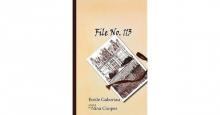 Le dossier no. 113. English
Le dossier no. 113. English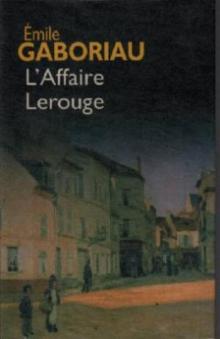 L'affaire Lerouge. English
L'affaire Lerouge. English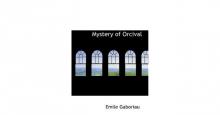 Le crime d'Orcival. English
Le crime d'Orcival. English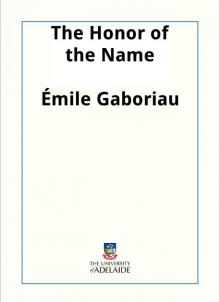 The Honor of the Name
The Honor of the Name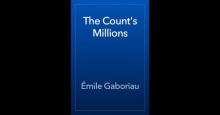 The Count's Millions
The Count's Millions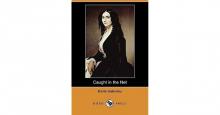 Caught in the Net
Caught in the Net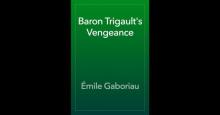 Baron Trigault's Vengeance
Baron Trigault's Vengeance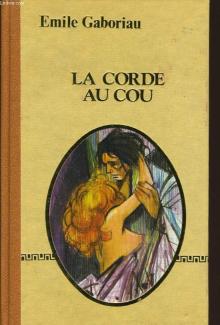 La clique dorée. English
La clique dorée. English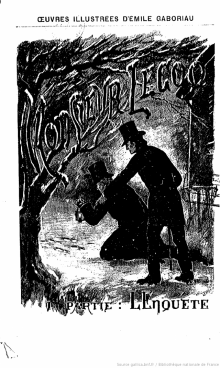 Monsieur Lecoq, v. 1
Monsieur Lecoq, v. 1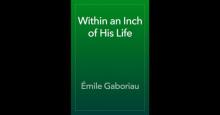 Within an Inch of His Life
Within an Inch of His Life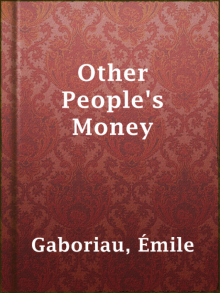 Other People's Money
Other People's Money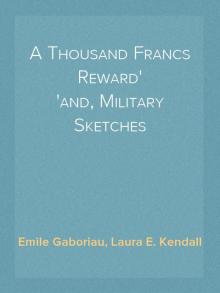 A Thousand Francs Reward; and, Military Sketches
A Thousand Francs Reward; and, Military Sketches